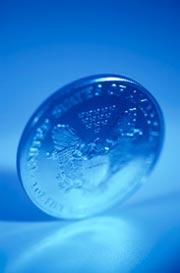 The smell of iron or copper comes from reactions with sweat and skin.Getty
The smell of iron or copper comes from reactions with sweat and skin.GettyWhy does metal smell? Chemists have found a surprising answer: it doesn't.
After you've grasped an iron railing, a door handle or a piece of steel cutlery, your hand often gives off what seems to be a metallic odour. But Dietmar Glindemann of the University of Leipzig, Germany, and his co-workers say that you're not smelling the metal at all.
They have found that the musty odour comes from chemical compounds in your skin, which are transformed in an instant by the touch of iron. They report the results in the international edition of Angewandte Chemie1.
Copper has a similar effect, accounting for the metallic smell created by handling coins made of copper alloys. "When a shopkeeper hands you a coin," says Glindemann, "you're smelling his body odour."
The smelly reactions induced by these metals create "the sensory illusion that it is the 'metal in itself' that we smell right after touching it", the researchers say. In other words, a 'metallic' smell is only deemed to be so by association.
Sweaty palms
“When a shopkeeper hands you a coin, you're smelling his body odour.”
Dietmar Glindemann,
University of Leipzig
Glindemann began studying this question years ago when he became curious about the garlic-tinged metallic aroma of iron after it has been touched by a sweaty palm. He found that acids naturally present in sweat induce reactions between carbon and phosphorus impurities typically present in iron, generating smelly, volatile molecules called organophosphines.
But the 'metallic' smell left on your hands after you handle iron or copper was different from the scent of metals touched by acid in the lab. "This problem tortured me for five or six years," Glindemann says.
The breakthrough came when he teamed up with environmental chemist Andrea Dietrich at Virginia Polytechnic Institute and State University in Blacksburg. She was trying to understand why people often complain of a metallic taste in drinking water.
Exploring the issue of metallic taste led her to think about metallic smell. That took her to Glindemann, and they cracked the problem together.
The researchers captured the vapours emitted from the skin of people who had handled iron objects, and studied their chemical composition. The gases contained several compounds called aldehydes and ketones, which often have strong and distinctive smells. The odour of preserving fluid, or formaldehyde, makes for the characteristic reek of old anatomy labs, for example, while the ketone acetone makes the distinctive solvent whiff of nail-varnish remover.
These compounds are produced by rapid reactions between iron or copper and oils on our skin.
Is that mushrooms?
One such compound in particular, called 1-octen-3-one, which is found in the vapours above skin touched by iron, is particularly smelly. Humans can detect it at very low concentrations, and experience it as a mushroom-like, metallic odour.
ADVERTISEMENT
The researchers think that every person generates a subtly different blend of odorant molecules when they touch metal, and that this blend may change if the individual has a disease such as cancer. So analysing the chemicals in 'iron smell', for example, might provide a kind of medical diagnostic tool. "We're now working to see if the smell caused by iron on skin provides a fingerprint of disease," says Glindemann.
The reactions could also explain Dietrich's question of why drinking water sometimes tastes metallic: organic food particles could be reacting with rust in the water to help form the odour compounds.
Visit our metallicsmellisjust_body.html">newsblog to read and post comments about this story.
University of Leipzig
-
References
- GlindemannD., et al. Angew. Chem. Int. Ed., 45 . 7006 - 7009 (2006). | Article |
